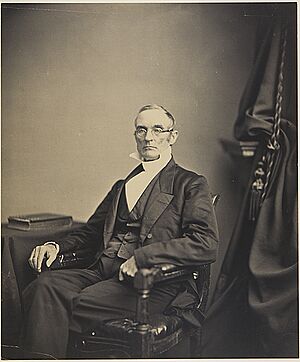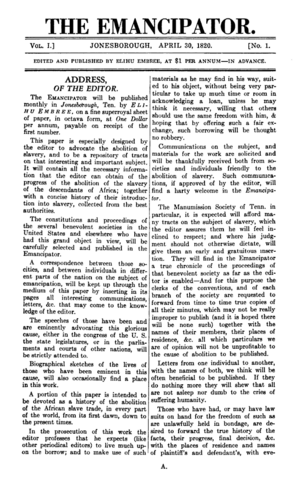Joshua Leavitt facts for kids

Rev. Joshua Leavitt (born September 8, 1794, in Heath, Massachusetts – died January 16, 1873, in Brooklyn, New York) was an important American Congregationalist minister. He was also a former lawyer. Leavitt became a well-known writer, editor, and publisher of materials that fought against slavery. This movement was called abolitionism. He was also a spokesperson for the Liberty Party. This party worked to end slavery. He also strongly campaigned for cheaper postage, which meant it would cost less to send letters. Leavitt edited several newspapers, including The Emancipator, The New York Independent, and The New York Evangelist. He was the first secretary of the American Temperance Society, which worked to reduce alcohol use. He also helped start the New York City Anti-Slavery Society.
Contents
Early Life and Education
Joshua Leavitt was born in Heath, Massachusetts, a town in the Berkshires. He went to Yale College and finished his studies when he was twenty years old. After college, he studied law and worked as a lawyer for a short time in Putney, Vermont. Later, he decided to study to become a minister at the Yale Theological Seminary. He studied there for three years. After his studies, he became a Congregational minister in Stratford, Connecticut.
After four years in Stratford, Rev. Leavitt moved to New York City. There, he became the secretary of the American Seamens' Friend Society. He also began his long career as an editor for Sailors' Magazine, which lasted 44 years. This was the start of Leavitt's work as a social reformer. He became a voice for temperance, an editor, an abolitionist, and someone who spread religious ideas.
Fighting Against Slavery
Joshua Leavitt was deeply involved in many important cases against slavery. One case involved an enslaved man named Basil Dorsey. Dorsey escaped from Maryland to Massachusetts. Leavitt helped Dorsey travel north. Members of Leavitt's family also helped hide Dorsey in Massachusetts.
Leavitt also played a key role in the famous La Amistad case. This case involved enslaved Africans who rebelled and took control of a Spanish ship. On September 4, 1839, Leavitt, along with Lewis Tappan and Simeon Jocelyn, created the Amistad Committee. This committee worked to raise money to help defend the enslaved Africans.
One of Leavitt's biggest achievements was helping to create the strong arguments against slavery. He did this through his writing and publishing. For example, in 1841, Leavitt published a powerful document called "Financial Power of Slavery." In this document, he argued that slavery was actually hurting the national economy. He showed that the Southern states' reliance on slavery was draining money from the country.
The Christian Lyre
In 1830, Leavitt published a book called The Christian Lyre. This book was very important because it was the first American hymnal (a book of hymns) that looked like modern ones. It had music for every hymn, showing the melody and bass parts. It also printed all the verses of the hymns right under or next to the music. The Christian Lyre later became one of the most popular hymn books used during the New England Revivalism movement in the 1830s.
Leavitt Family's Role in Abolition
Rev. Joshua Leavitt came from a family with a long history of religious figures. His father, Col. Roger Leavitt, was a wealthy landowner and a lawmaker in Massachusetts. His mother was Chloe (Maxwell) Leavitt. His grandfather, Rev. Jonathan Leavitt, was also a Congregational minister and a Yale graduate. The Leavitt family had connections to religious groups for many generations. For example, Joshua Leavitt's ancestor John Leavitt helped found the Old Ship Church in Hingham, Massachusetts. Another ancestor, Rev. Thomas Hooker, left the Massachusetts Bay Colony to start the state of Connecticut.
Joshua Leavitt's son, William, also became a Congregational minister in Hudson, New York. Besides Joshua Leavitt himself, other members of his family were strong abolitionists. The National Park Service lists two properties belonging to the Leavitt family in upstate Massachusetts. These are the Hart and Mary Leavitt House and the Roger Hooker and Keziah Leavitt House. Both of these homes are part of the National Underground Railroad historic sites tour. This shows that the entire extended family of Rev. Joshua Leavitt were very active in supporting the movement to end slavery.
See also
 | Sharif Bey |
 | Hale Woodruff |
 | Richmond Barthé |
 | Purvis Young |


